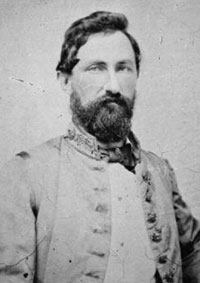
William Lewis Cabell (1827-1911)
William Lewis Cabell (January 1, 1827 - February 21, 1911) was a brigadier general in the Confederate States Army during the American Civil War and later served as Mayor of Dallas, Texas.
William L. Cabell was born in Danville, Virginia. Six of Cabell's brothers also held prominent positions in the Confederate Army. One other brother died just prior to the Civil War from an arrow wound received in Florida. Cabell graduated from the United States Military Academy in 1850 and joined the United States Army as a second lieutenant with the 7th Infantry. In June of 1855, he was promoted to first lieutenant and appointed as regimental quartermaster on the staff of General Persifer F. Smith. 
At the outbreak of the Civil War, Cabell returned to Little Rock, Arkansas, and offered his services to Governor Henry Massey Rector. During April of 1861, he received a telegram from the Confederate States government and went to Richmond, Virginia and assisted in the establishment of the commissary, quartermaster, and ordnance departments for the Confederate military.
He was sent to Manassas, Virginia to take the position of Quartermaster for the Confederate Army of the Potomac under General Pierre G.T. Beauregard. He served on Beauregard's staff and then on the staff of General Joseph E. Johnston until reassigned in January of 1862.
After leaving Virginia, Cabell was assigned by General Albert Sidney Johnston to serve under General Earl Van Dorn who was commander of the Trans-Mississippi Department. Cabell was promoted to brigadier general and placed in command of all Confederate troops on the White River with his headquarters at Jacksonport, Arkansas. Soon after the Battle of Pea Ridge Confederate forces were withdrawn from Arkansas and moved across the Mississippi River. Upon his arrival at Corinth, Mississippi, Cabell was given command of a Texas brigade with an Arkansas regiment attached. Cabell led this brigade in several engagements around Corinth.
Cabell was transferred to an Arkansas brigade, which he led in the Battle of Iuka, Battle of Saltillo, and the Battle of Corinth. He was wounded leading a charge against the Union entrenchments at Corinth and again at the Battle of the Hatchie River Bridge, which left him temporarily disabled and unfit for field command.
In February of 1863, he was placed in command of northwestern Arkansas and successfully recruited and outfitted one of the largest cavalry brigades west of the Mississippi. Cabell led this brigade in over 20 engagements in the Trans-Mississippi Department including prominent roles at the Battle of Poison Spring and the Battle of Marks' Mill where he commanded two brigades under General James Fleming Fagan. Cabell was captured by Union forces in Missouri during Price's Raid on October 25, 1864, and was held as a prisoner of war at the Johnson's Island prison camp on Lake Erie and then at Fort Warren in Boston, Massachusetts.
After the war, Cabell returned to Fort Smith, Arkansas, where he worked as a civil engineer and studied law at night. He was admitted to the Arkansas bar in 1868 and practiced law for a few years. In 1872, Cabell and his family moved to Dallas, Texas. In 1874, he was elected mayor of that city and served four terms at various. During his tenure, he expanded rail access to the city, established sewer and electrical services, started a program of paving streets, and presided over a period of massive growth.
After leaving office, Cabell became Vice President of the Texas Trunk Railroad Company. In 1885, he was appointed U.S. Marshal and served in that capacity until 1889. During the Spanish-American War, at age 71, he offered his military services to the U.S. government.
Cabell also remained active in Confederate veterans affairs. He oversaw several large veterans reunions, assisted in establishing pensions, veterans homes, and Confederate cemeteries in Texas. He served as commander of the Trans-Mississippi Department of the United Confederate Veterans.
Cabell's wife was the daughter of Major Elias Rector of Arkansas and served as a nurse during the Civil War.
William Lewis Cabell died in Dallas on February 21, 1911 and was buried there five days later after a heavily attended military parade.